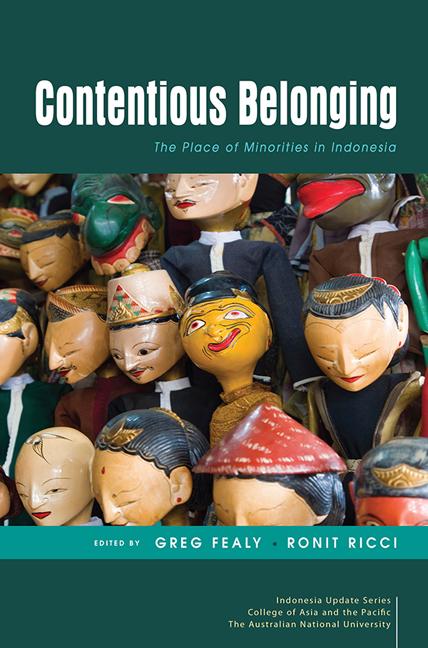Book contents
- Frontmatter
- Contents
- Tables and figures
- Contributors
- Acknowledgments
- Glossary
- Map
- 1 Diversity and its Discontents: an Overview of Minority–Majority Relations in Indonesia
- PART 1 HISTORY AND LAW
- PART 2 DISABILITY
- PART 3 SEXUALITY
- 7 Is the Recent Wave of Homophobia in Indonesia Unexpected?
- 8 Localising Queer Identities: Queer Activisms and National Belonging in Indonesia
- PART 4 RELIGION AND ETHNICITY
- PART 5 REFLECTIONS
- Index
- Indonesia Update Series
7 - Is the Recent Wave of Homophobia in Indonesia Unexpected?
from PART 3 - SEXUALITY
Published online by Cambridge University Press: 06 September 2019
- Frontmatter
- Contents
- Tables and figures
- Contributors
- Acknowledgments
- Glossary
- Map
- 1 Diversity and its Discontents: an Overview of Minority–Majority Relations in Indonesia
- PART 1 HISTORY AND LAW
- PART 2 DISABILITY
- PART 3 SEXUALITY
- 7 Is the Recent Wave of Homophobia in Indonesia Unexpected?
- 8 Localising Queer Identities: Queer Activisms and National Belonging in Indonesia
- PART 4 RELIGION AND ETHNICITY
- PART 5 REFLECTIONS
- Index
- Indonesia Update Series
Summary
Indonesia has long been seen as a country that is relatively friendly towards lesbian, gay, bisexual and transgender (LGBT) people. This is due in particular to the public visibility of male-to-female (MTF) trans people, known as waria (from wanita–pria, woman–man). Until a few years ago, consensual homosexual acts among adults were not criminalised. Since late 2015, however, a campaign of virulent homophobia has shattered the image of Indonesia as an LGBT-tolerant country, and a campaign to criminalise all sex outside marriage is now under way. The people behind this campaign invoke tradition, morality and religion to ‘prove’ that same-sex relations and transgender practices are alien to the country. This homophobic campaign is interwoven with and strengthened by a ‘red scare’. In this chapter, I analyse the sexual moral campaigns deployed in the ‘othering’ of two minorities, LGBT activists and alleged communists.
I argue that heteronormativity has always been the dominant regime in the country, invisibilising same-sex practices. Its passionate aesthetics have even informed attitudes towards the major exception to invisibility, the waria. I first query how ‘tolerant’ the Indonesian archipelago may actually have been towards same-sex practices. Next, I provide some examples of the homophobic campaign that has swept the country since 2015. I contrast this with the preceding period, in which LGBT issues gradually became more visible and sexual rights could be discussed more openly. A discourse of human and women's rights emerged after the fall of the military dictatorship of President Suharto in 1998 (Wieringa 2015b). In this more open climate, gay and lesbian people attempted to stake a claim in the public sphere and to set up or strengthen various sexual rights groups (Boellstorff 2005; Wieringa 2007).
Indonesia has experienced two major episodes of sexual moral panic in the post-independence period. The first occurred in the mid-1960s in conjunction with an army-orchestrated campaign of sexual slander that helped to incite Indonesians to slaughter their neighbours. The massacre of up to 1 million people, which amounted to a genocide, and other crimes against humanity occurred after a segment of the army murdered six generals and a lieutenant on 1 October 1965 in what was seen as an unsuccessful coup attempt (Robinson 2018; Wieringa, Melvin and Pohlman 2019).
- Type
- Chapter
- Information
- Contentious BelongingThe Place of Minorities in Indonesia, pp. 113 - 132Publisher: ISEAS–Yusof Ishak InstitutePrint publication year: 2019



